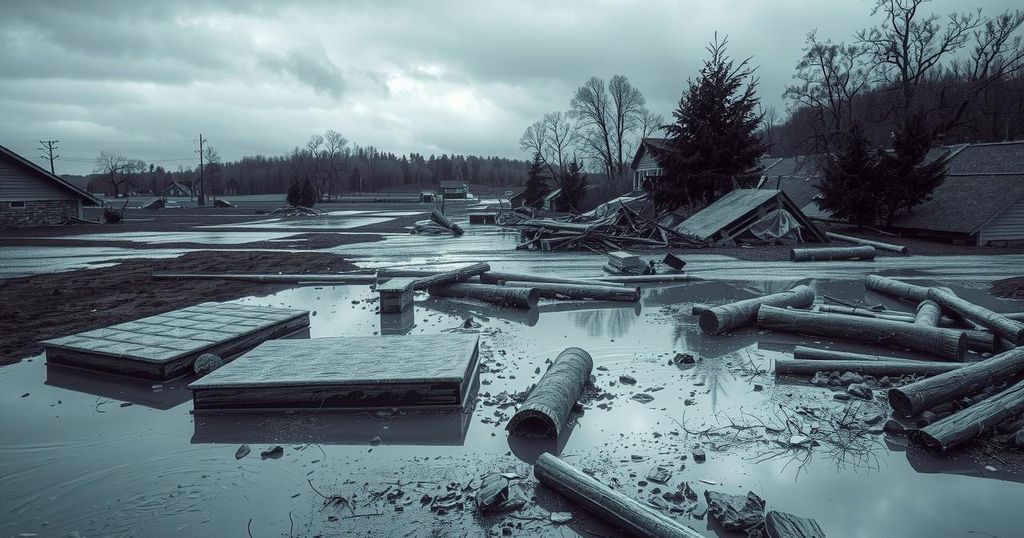Residents in Niger State Struggle with Stench of Decaying Bodies After Flood

In the wake of severe flooding in Mokwa, Niger State, residents struggle with the overwhelming stench of decaying corpses still trapped under debris. The floods, which occurred on May 28 and 29, drowned around 200 individuals and displaced over 3,000 people. Both the federal and state governments have announced significant financial aid to support recovery efforts, but residents remain concerned about health risks and the still-unrecovered bodies.
The recent flooding in Mokwa Local Government Area of Niger State has left the community grappling with a disturbing issue—the foul smell of decaying corpses. Nearly two weeks post-flood, these odors emanate from bodies still buried beneath debris and sand, according to local residents. The situation has raised alarms regarding health risks as the stench continues to plague the survivors, reminding them of the tragic events that unfolded during the floods.
The floods struck on May 28 and 29, leading to the drowning of approximately 200 people as relentless rainfall caused severe deluge. The Niger State Emergency Management Agency (NSEMA) reports that over 50 homes were destroyed, rendering more than 3,000 individuals displaced and affecting 503 households. An official report indicates that 161 corpses have been recovered so far, yet many remain unaccounted for beneath the debris.
Esther Nwanosike, a local vendor, told The PUNCH about the increasingly unbearable smell. “I sell food in a makeshift shop. The smell is overwhelming, and I am concerned about the potential health implications. My customers who come here to eat are complaining about it.” Nwanosike implored the government for action, advocating for fumigation in the area to mitigate the dreadful odors.
Alhassan Kolo, another resident, echoed concerns about the lingering stench, hinting that the number of recovered bodies has left many unrecognizable. He remarked, “Honestly, some of the bodies we recovered, you can’t even recognize them anymore because they are decaying. As we dig through the sand, we discover property and corpses.” Residents, like Ahmed Yusuf, vented frustration over the situation, fearing for their health due to decaying corpses still unlocated.
Amid these concerns, many displaced residents prefer not to stay in the camps set up by the government. Salihu Ishaq shared how devastating the situation has been for the community, recounting personal losses including a sister and her children swept away by the floods.
In response to the unfolding tragedy, the Federal Government, represented by Vice President Kashim Shettima, announced a N2 billion relief package aimed at aiding those affected. Additional support has come from the state government, which pledged N1 billion for similar rehabilitative efforts. Amina Abubakar, who lost family members in the incident, urgently called for governmental action to assist the survivors, as many have been left without shelter and basic necessities.
Idris Ibrahim, Director of Public Health, reassured the public that the government is taking measures to address the odor issue. “We are doing something about it. A prevention control team is there, and officials are working round the clock to ensure that the smell issue is addressed,” he said during an interview. However, he noted that plans for relocating affected residents are still under consideration.
The NSEMA’s spokesperson, Hussein Ibrahim, did not immediately respond for further comments, but the Director General, Abdullahi Baba-Arah, confirmed the death toll had reached 161 as of June 4, with efforts ongoing to recover additional missing bodies.
As communities process their grief and losses, the Director of the National Emergency Management Agency, Manzo Ezekiel, emphasized a coordinated response involving multiple government bodies to support recovery efforts. He acknowledged that the unpleasant odors in the area may not solely originate from decomposing bodies, pointing out that human waste and sanitation issues exacerbated by the floodwaters also contribute to the stench.
Additionally, Niger State Governor, Mohammed Bago, noted that the floods might have been exacerbated by overflow from neighboring countries, including Niger Republic. He urged for advocacy to relocate people from vulnerable coastline areas. During a condolence visit, Bago commended Borno State Governor Babagana Zulum for a donation of N300 million aimed at supporting flood victims and urged for stronger strategies to mitigate climate change-related disasters.
In conclusion, the aftermath of the floods in Niger’s Mokwa community has plunged residents into deep distress, compounded by the nauseating smell of decaying bodies. Despite governmental pledges of financial aid and support, the community grapples with significant health concerns and a chronic lack of satisfactory shelter for the displaced. As both state and federal agencies mobilize resources, the urgency to address public health concerns and provide tangible relief to the survivors remains paramount. The local residents urge for swift government action to fully recover the missing and restore normalcy to their lives.
Original Source: punchng.com








